What is Seretide Accuhaler?
How does Seretide Accuhaler work?
What are the benefits of using Seretide Accuhaler?
Seretide inhaler uses include being indicated as a treatment for respiratory diseases such as asthma and COPD (chronic obstructive pulmonary disease). The active substance salmeterol relaxes the muscles of the airways to facilitate breathing. The added fluticasone reduces the sensitivity of the airways to stimuli such as humidity, pets, or smoke, in addition to stopping the inflammation they cause. Seretide is used as a prevention, to prevent symptoms from appearing (chest tightness, cough, and shortness of breath); it is not effective in relieving acute respiratory crises.
How do I use Seretide Accuhaler & its dosage?
Using the accuhaler
- To open the Accuhaler, grasp the outer casing with one hand and place the thumb of the other hand in the space reserved for it. Push with your finger, away from you, as far as it will go. You will hear a click. This will open a small hole in the nozzle.
- Hold the device with the mouthpiece towards you. You can hold it with your right or left hand. Slide the lever away. You will hear a click. This will place the dose of medication in the mouthpiece.
- Every time the lever is pulled back, and alveolus opens and the powder is ready to be inhaled. Do not play with the lever because they open the alveoli and medicine is wasted.
- Keep the Accuhaler away from the mouth. Expel air as reasonably as possible. Do not breathe inside the Accuhaler.
- Place the mouthpiece on the lips; breath in progressively and intensely through the Accuhaler, not through the nose.
- Take the Accuhaler out of your mouth.
- Hold your breath for about 10 seconds or as long as possible.
- Expel air slowly.
- Then rinse your mouth with water and spit it out and/or brush your teeth. This can help you prevent mouth ulcers and hoarseness.
- To close the Accuhaler, slide the lever toward you as far as possible with your thumb. You will hear a click.
The lever will automatically return to its original position. The Accuhaler is now ready for reuse.
As with all inhalers, caregivers should ensure that children using Seretide Accuhaler correctly use the inhalation technique described above.
Using the inhaler
It is important to start breathing in as slowly as possible just before using your inhaler.
- It is recommended that you stand or sit upright while using the inhaler.
- Remove the mouthpiece guard. Check inside and outside that the nozzle is clean and that there are no foreign particles.
- Shake the inhaler 4 or 5 times to ensure the removal of any foreign particles and that the contents of the inhaler are mixed properly.
- Hold the inhaler upright with your thumb at the base of the inhaler, below the mouthpiece. Expel as much air as possible.
- Place the mouthpiece in the mouth between the teeth. Close your lips around the mouthpiece. Don’t bite it.
- Take air through your mouth slowly and deeply. Right after you start to breathe in, press firmly on the top of the inhaler to release the medicine. Do this while continuing to breathe deeply and constantly.
- Hold your breath, remove the inhaler from your mouth by removing your finger from the top of the inhaler. Continue to hold your breath for a few seconds, as much as possible.
- Wait approximately half a minute between each application of the medicine and then repeat steps 3 to 7.
Then rinse your mouth with water and spit it out and / or brush your teeth. This will help you prevent ulcerations in your mouth and hoarseness.
After use, always replace the mouthpiece guard immediately to protect it from dust. When the mouthpiece guard is placed correctly it will click. If it does not click, turn the mouthpiece guard upside down and try again. Do not use excessive force.
Its dosage
Always use this medicine exactly as your doctor or pharmacist has told you. If in doubt, consult your doctor or pharmacist again.
Use Seretide every day, until your doctor tells you to stop. Do not take more than the recommended dose. If in doubt, ask your doctor or pharmacist.
Do not stop taking Seretide or reduce your dose without talking to your doctor first.
Seretide should be inhaled through the mouth into the lungs.
Adults and adolescents 12 years and older
Seretide 25/50 micrograms 2 applications twice a day
Seretide 25/125 micrograms 2 applications twice a day
Seretide 25/250 micrograms 2 applications twice a day
Children from 4 to 12 years old
Seretide 25/50 micrograms 2 applications twice a day
Seretide is not recommended for use in children younger than 4 years of age.
Your symptoms can become well controlled using Seretide twice a day. If so, your doctor may decide to decrease your dose to once a day. The dose may change to:
- once at night if you have nighttime symptoms,
- once in the morning if you have daytime symptoms.
What are the Side effects & precautions of Seretide Accuhaler?
Like all medicines, the Seretide Asthma Inhaler can cause side effects, although not everybody gets them. To reduce the occurrence of side effects, your doctor will prescribe the lowest dose of Seretide that controls your asthma or chronic obstructive pulmonary disease (COPD).
Allergic reactions: You may notice that your breathing suddenly worsens immediately after using Seretide. You may experience wheezing and coughing or shortness of breath. You may also notice itching, rash (hives), and swelling (usually of the face, lips, tongue, or throat). You may also suddenly feel like your heart is beating very fast, feel unconscious and dizzy (which can lead to collapse or loss of consciousness). If you experience any of these effects or appear suddenly after using Seretide, stop taking Seretide and contact your doctor immediately. Allergic reactions to Seretide are rare (affecting less than 1 in 100 people).
Pneumonia (infection of the lungs) in patients with COPD (frequent side effect)
Tell your doctor if you have any of the following symptoms while inhaling Seretide, they could be symptoms of a lung infection:
- Fever or chills
- Increased mucus production, change in mucus color
- Increased cough or increased difficulty breathing
Other side effects are listed below:
Very common (may affect more than 1 in 10 people)
- Headache, which usually improves with continued treatment.
- An increase in the number of colds has been reported in patients with chronic obstructive pulmonary disease (COPD).
Common (may affect less than 1 in 10 people)
- Candidiasis (itching, the appearance of creamy yellow ulcers) in the mouth and throat. Also sore tongue, hoarse voice, and sore throat. Rinsing your mouth with water and spitting it out and / or brushing your teeth immediately after each dose of medicine can help.
- For the treatment of candidiasis, your doctor may prescribe antifungal medication (for the treatment of yeast infections).
- Pain, inflammation in the joints, and muscle pain.
- Muscle cramps.
The following side effects have been reported in patients with Chronic Obstructive Pulmonary Disease (COPD):
- Cardinals and fractures.
- Inflammation of the breasts (a feeling of tightness or congestion in the nose, cheeks, and behind the eyes, sometimes with throbbing pain).
- Decreased blood potassium levels (you may feel irregular heartbeats, muscle weakness, cramps).
Uncommon (may affect less than 1 in 100 people)
- Increased blood sugar (glucose) levels (hyperglycemia). If you have diabetes, it will be
- It is necessary to control your blood sugar levels more frequently and adjust your usual diabetic treatment if necessary.
- Cataracts (clouding of the lens of the eye).
- Very fast heart rate (tachycardia).
- Feeling tremors and fast or irregular heart rhythm (palpitations). These side effects are usually harmless and decrease with continued treatment.
- Chest pain.
- Feeling of concern (occurs mainly in children).
- Sleep disorders.
- Acne
- Allergic rash on the skin.
Rare (may affect less than 1 in 1,000 people)
- Shortness of breath (or wheezing) that gets worse right after using Seretide. If this happens, stop using Seretide. Use your quick-acting “rescue” inhaler to improve your breathing, and tell your doctor right away.
- Seretide can increase the normal production of steroid hormones, particularly if you have been taking high doses for long periods of time. The effects include:
- Delayed growth in children and adolescents.
- Decreased bone mineral density.
- Glaucoma
- Weight gain.
- Rounded face (shaped like a full moon) (Cushing’s syndrome).
Your doctor will regularly monitor any of these side effects and will make sure that you are taking the lowest dose of Seretide to control your asthma.
Changes in behavior, such as hyperactivity and irritability (these effects occur mainly in children).
Irregular heartbeat or an abnormal heartbeat (arrhythmias). Talk to your doctor, but do not stop taking Seretide unless your doctor tells you to.
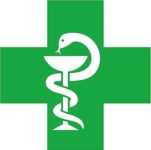
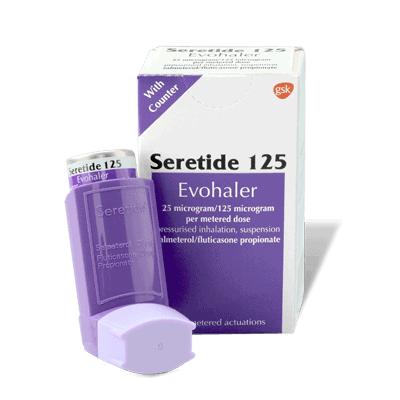
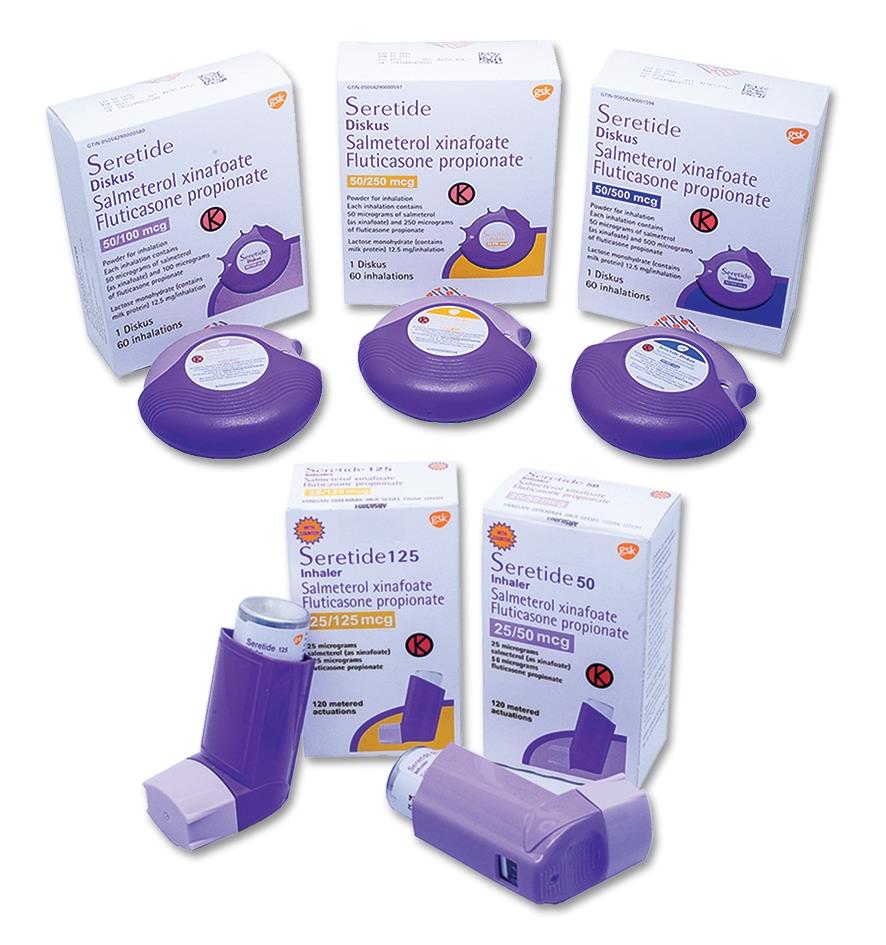
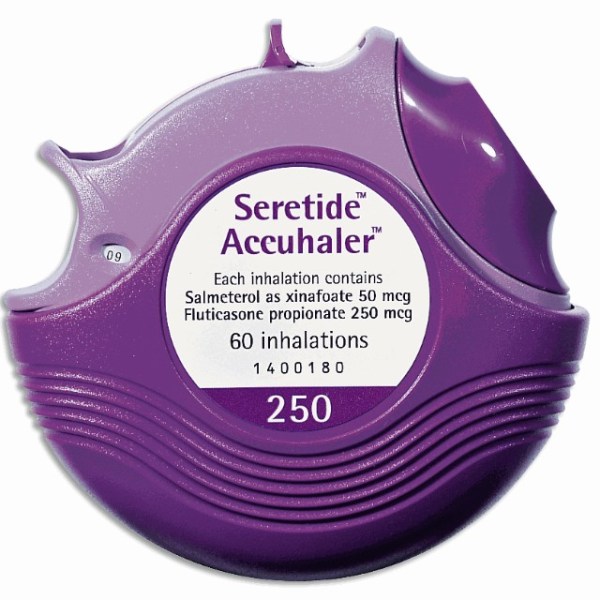
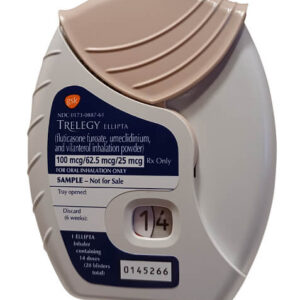
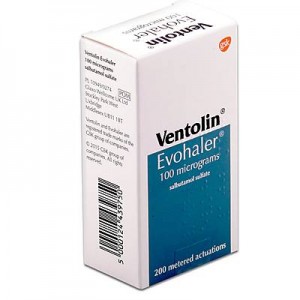
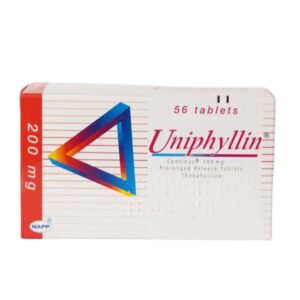
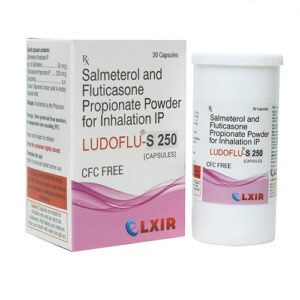
Reviews
There are no reviews yet.